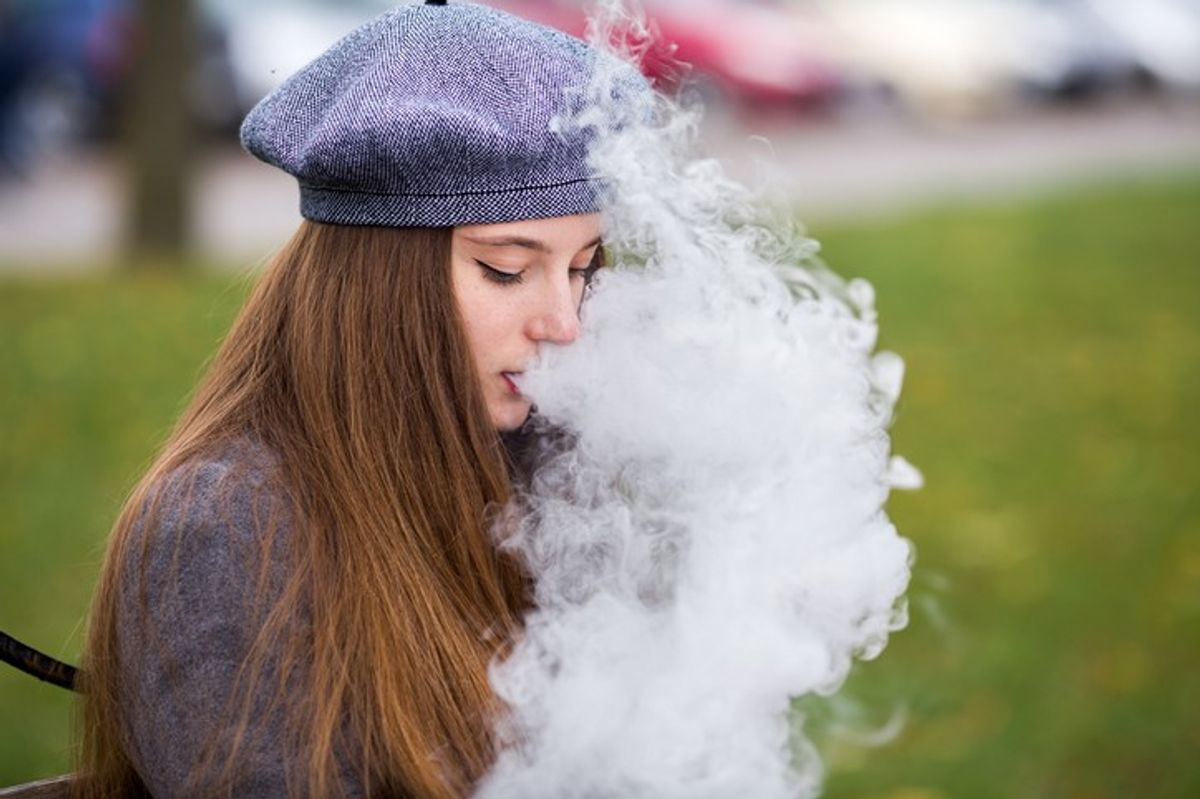E-cigarette users with a limited smoking history experience similar DNA changes to specific cheek cells as smokers, a new study led by researchers at UCL and University of Innsbruck has found.
While the study does not show that e-cigarettes cause cancer, researchers called for studies with long-term follow up to assess whether e-cigarettes have harmful effects and, if so, what they are.
The study, published in Cancer Research, analysed the epigenetic effects of tobacco and e-cigarettes on DNA methylation in over 3,500 samples, to investigate the impact on cells that are directly exposed to tobacco (e.g. in the mouth) and those that are not directly exposed (e.g. in blood or cervical cells).
The epigenome refers to an extra layer of information that is superimposed on our genetic material – the DNA. While DNA can be compared to the ‘hardware’ of a computer, epigenetics are comparable to the computer’s ‘software’ and define how, where and when the programs used by the computer are run.
The researchers found that epithelial cells (cells that typically line organs and are often the cells of origin for cancer) in the mouth showed substantial epigenomic changes in smokers. Importantly, these changes are further elevated in lung cancers or pre-cancers (abnormal cells or tissue that have the potential to develop into cancer), when compared to the normal lung tissue, supporting the idea that the epigenetic changes associated with smoking allow cells to grow more quickly.
The publication also includes new data showing the similar epigenomic changes were likewise observed in the cells of e-cigarette users who had only ever smoked less than 100 tobacco cigarettes in their lives.
“We cannot say that e-cigarettes cause cancer based on our study, but we do observe e-cigarette users exhibit some similar epigenetic changes in buccal cells as smokers, and these changes are associated with future lung cancer development in smokers,”Dr Chiara Herzog, of UCL EGA Institute for Women’s Health and University of Innsbruck, and the first author of the study, said.
“Further studies will be required to investigate whether these features could be used to individually predict cancer in smokers and e-cigarette users.”
The UK Vaping Industry Association (UKVIA) has welcomed the research, saying that this would help to better understand the relative risks of vaping and smoking.
“What we do know is that smoking causes at least 15 different types of cancer, is the biggest cause of cancer in the world and is responsible for 250 deaths in the UK every day,” the trade body noted.
“The study authors said their findings showed that vapes ‘might not be as harmless as originally thought’ but it is important to make clear that nobody in the vape industry ever said that vaping was harmless. There are risks from vaping but they are tiny compared to smoking.”
The latest study is also questioned by leading experts such as Peter Shields, an emeritus professor of medical oncology at Ohio State University. He stated that critical pieces of information are missing and calls the smoking and vaping data that they are working from as “crude”.
“To make their claims of adverse effects, there are critical pieces of information that are missing. They do not have good vaping/smoking data so mostly rely on each person saying yes/no, or self-reporting years of use. This is very crude and without the dose-response assessment (e.g., packs per day, vapes per day, etc), they are still a far distance from being able to show causality. For the vapers, there was no biochemical verification that they were actually not also smokers,” Prof Shields said.
“The crucial question is not whether vaping has epigenetic changes (which we cannot say establish a risky cell type or a physiological protective mechanism to prevent disease) – but how do vapers compare to smokers and never-smokers. They really do not explore that well, but in fact the data looks like vapers are actually more like never-smokers – implying their risk of cancer is not increased by vaping! This is not discussed. The authors really need to be more cautious.”
Dr Marina Murphy, Scientific and Medical Affairs, MME International, said the relevance of the study findings to clinical effects was 'highly questionable'.
“There are serious limitations to translating the results of this study into clinical effects. This study looks at the methylation of DNA, whereby a methyl group becomes attached to the DNA strand,” Dr Murphy said.
“The data exhibits considerable variability and changes in hypermethylation become apparent in individuals after just one year. Given what we know about smoking – the more you smoke and the longer you smoke, the higher the risk – and the fact that no clear dose-response relationship is observed here, hypermethylation would seem to be a poor proxy for lung cancer risk.
“In addition, similar effects were seen in smokers and users of smokeless tobacco. We know from years of epidemiology that smokeless tobacco users do not have a heightened risk of cancer, which also makes the relevance of these findings to clinical effects highly questionable.”


